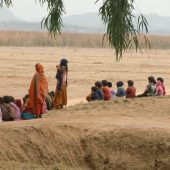
Access to fresh water is every individual’s universal and human right, and it is a key instrument in meeting the sustainable development goals given the important social, economic, and political roles that this natural resource pertains to. But the reality is that millions of people across the globe are suffering because water resources are diminishing. World leaders, researchers, and journalists, have gone as far as to say that water scarcity will be the next probable cause for world conflict (Molen & Antoinette, 2005). Yet issues regarding the insufficiency of water are not talked about extensively in the world, and the planet turns a blind eye to the global water crisis, assuming it to be a renewable natural resource that nature will keep on recharging. But the truth is, that human demand for ecological resources has been exhausting resources faster than the nature has the capacity to replenish them, and if human habits and unsustainable use of resources do not change than global resource crisis, like the present global water scarcity crisis, will surely intensify and become the leading cause for conflicts (Shahid, 2016). One major cause for the lack of mainstreaming of the water crisis is because of its portrayal as a stand-alone issue to the general public, owing greatly to the lack of world governments and their inability to contextualize it as a multi-dimensional problem. This paper highlights the crucial need for adopting a multi-dimensional approach for the dissemination of the problem. It follows an exploratory stance and sheds light on the multipronged social challenges and resulting vulnerabilities associated with water challenges in Pakistan.
Continue Reading
This conceptual article examines how teaching and learning has changed and continues to change as a result of the increase in cultural diversity in post-secondary classrooms. It focuses on how students’ and instructors’ culture and traditions impact the teaching and learning experience in culturally diverse post-secondary settings. Providing evidence from theoretical perspectives, this review assesses the need for and the potentially transformative nature of education that is sustainable.
English may be the lingua franca on North American university campuses, as well as on many campuses around the world, but since students and instructors come from many different backgrounds, just because English is the predominant language does not necessarily mean that education based on Western principles is the only way to do education. International students and instructors come from countries where education may be conducted differently and since the North American university system requires learning to be demonstrated in certain ways, it puts students that come from different systems at a disadvantage. Therefore it would seem that North American universities could benefit from the tenets of culturally sensitive teaching that Gay (2000) suggests as comprehensive, multidimensional, empowering, transforming, and emancipatory.